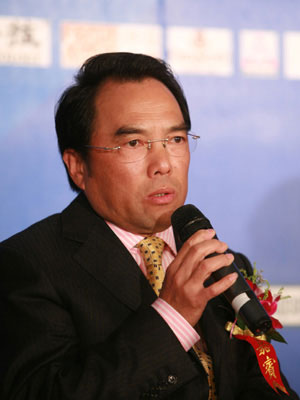|

|
|
Shen Guofang, born in November 1952, is former director-general and spokesman of Press and Media Service, Ministry of Foreign Affairs, former vice representative and ambassador to the United Nations, former assistant minister of foreign affairs, now chief editor of the World Affairs Press. |
Shen Guofang, now chief editor of the World Affairs Press, has followed the development of Sino-US relations and he was also one of the decision-makers on diplomatic policies towards the United States. Shen believes that Sino-US ties have passed through four stages of development since 1978.
Friendly relations, but no Sino-US alliance
US President Richard Nixon visited China in 1972 during which the Shanghai Communique was signed, marking the end of isolation between China and the United States. The two parties established diplomatic relations in 1979. Washington valued Sino-US ties as friendly, but not as between two allies.
Sino-US ties developed quickly and smoothly, despite some conflicts between 1972 and 1988 due to the competing strategic interests of the two parties. Over this period the United States revised its diplomatic policies in the Asia-Pacific area.
China took the initiative
The structure of the world changed dramatically between the late 1980s and early 1990s, with the disintegration of the former Soviet Union and upheaval in Eastern Europe.
The former Foreign Minister Qian Qichen was accompanied by Shen Guogang on his visit to Latin America in June 1989 when China was plunged into political disturbances. The group planned to head to the United States after their visit to Latin America. In fact, a debate over China-US relations that was hostile to China was ongoing in America at that time.
The former foreign minister and his entourage talked all through the night trying to work out a strategy regarding their visit to the United States. Ultimately, the group decided to delay the visit.
China did not collapse
The US-led western world imposed sanctions against China between 1989 and the middle 1990s. Washington expected that China might experience dramatic changes under the great pressure from the western countries.
The sanctions did not bring about the effect the western world expected. Instead of suffering collapse, China's economy enjoyed a period of growth, and the country also started preparing for the return of Hong Kong and Macao.
Subsequently, Washington decided to increase contacts with Beijing, while at the same time keeping restraint on China. The Chinese government also called for mutual trust and cooperation based on strategic analysis instead of antagonism. Sino-US relations improved gradually as the U.S. Secretary of State James Addison Baker visited China.
The two parties agreed upon joint efforts to establish a strategic partnership while Bill Clinton was in power, although at the time this seemed a highly ambitious goal. China's central government maintained that economic development should be the top priority during this period, a policy that Shen believes was sensible.
The 9.11 attack caused Bush to change his policies towards China
George W. Bush was elected President of the United States in 2001. The Bush administration modified its foreign policies and carried out a series of unilateral actions in foreign affairs.
Following his election, Bush delivered a series of unfriendly speeches on the Taiwan issue. There was too much strain between China and the United States during this period. But the 9.11 attack brought a lot of change to the world. The Americans realized that the major threat they faced was terrorist attack, not China.
Shen Guofang was a vice representative to the United Nations at the time. "China should not be an adversary of the United States," an American ambassador told Shen privately. Washington was beginning to understand the importance of cooperation between the two sides, and the Sino-US relationship was thawing.
Bush attended the APEC summit in Shanghai in 2001, which was his first visit after the 9.11 attack. This was a meaningful visit, during which the United States evaluated Sino-US ties as a constructive and cooperative partnership. Despite competition and conflict in certain areas, cooperation was becoming the main thread of the relationship between the two parties.
Factors that influence Sino-US relations
The first factor, according to Shen, is that the two sides have common security interests.
The second is China's growing economy. Washington has realized that restraining China is not sensible and realistic in the context of China's rapid development, so the United States has decided to adopt a positive attitude in developing bilateral ties.
Thirdly, there is the growing interdependence of the two parties in trade. Bush attended the Opening Ceremonies of the Beijing Olympics this year in spite of objections from the United States. Shen believes that Bush's attendance proves that Washington attaches great importance to Sino-US ties.
(China.org.cn by Yang Xi, December 10, 2008)